In jurisprudence, double jeopardy is a procedural defence that prevents an accused person from being tried again on the same charges following an acquittal or conviction and in rare cases prosecutorial and/or judge misconduct in the same jurisdiction. Double jeopardy is a common concept in criminal law – in civil law, a similar concept is that of res judicata. The double jeopardy protection in criminal prosecutions bars only an identical prosecution for the same offence except when the defendant is a servicemember as the courts have ruled that the military courts are a separate sovereign, therefore servicemembers can be held in two separate trials for exactly the same charges; however, a different offence may be charged on identical evidence at a second trial. Res judicata protection is stronger – it precludes any causes of action or claims that arise from a previously litigated subject matter.

Whilst the House of Lords of the United Kingdom is the upper chamber of Parliament and has government ministers, for many centuries it had a judicial function. It functioned as a court of first instance for the trials of peers and for impeachments, and as a court of last resort in the United Kingdom and prior, the Kingdom of Great Britain and the Kingdom of England.
The Courts of England and Wales, supported administratively by His Majesty's Courts and Tribunals Service, are the civil and criminal courts responsible for the administration of justice in England and Wales.
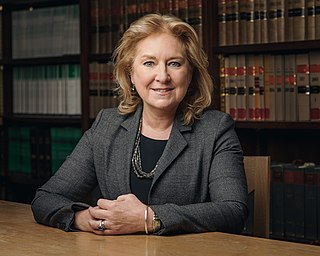
The Lord or Lady Chief Justice of England and Wales is the head of the judiciary of England and Wales and the president of the courts of England and Wales.

In the history of the courts of England and Wales, the Judicature Acts were a series of acts of Parliament, beginning in the 1870s, which aimed to fuse the hitherto split system of courts of England and Wales. The first two acts were the Supreme Court of Judicature Act 1873 and the Supreme Court of Judicature Act 1875, with a further series of amending acts.
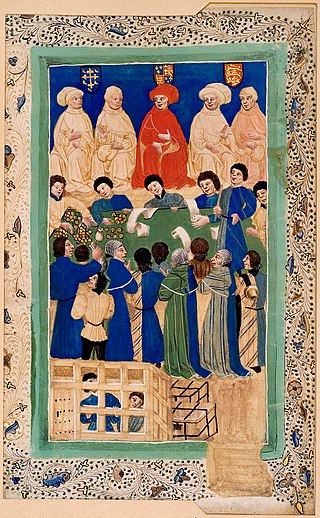
The Exchequer of Pleas, or Court of Exchequer, was a court that dealt with matters of equity, a set of legal principles based on natural law and common law in England and Wales. Originally part of the curia regis, or King's Council, the Exchequer of Pleas split from the curia in the 1190s to sit as an independent central court. The Court of Chancery's reputation for tardiness and expense resulted in much of its business transferring to the Exchequer. The Exchequer and Chancery, with similar jurisdictions, drew closer together over the years until an argument was made during the 19th century that having two seemingly identical courts was unnecessary. As a result, the Exchequer lost its equity jurisdiction. With the Judicature Acts, the Exchequer was formally dissolved as a judicial body by an Order in Council on 16 December 1880.

The courts of Scotland are responsible for administration of justice in Scotland, under statutory, common law and equitable provisions within Scots law. The courts are presided over by the judiciary of Scotland, who are the various judicial office holders responsible for issuing judgments, ensuring fair trials, and deciding on sentencing. The Court of Session is the supreme civil court of Scotland, subject to appeals to the Supreme Court of the United Kingdom, and the High Court of Justiciary is the supreme criminal court, which is only subject to the authority of the Supreme Court of the United Kingdom on devolution issues and human rights compatibility issues.

The Supreme Court of the United Kingdom is the final court of appeal in the United Kingdom for all civil cases and for all criminal cases originating in England, Wales and Northern Ireland, as well as some limited criminal cases from Scotland. As the United Kingdom's highest appellate court for these matters, it hears cases of the greatest public or constitutional importance affecting the whole population.

Sir Charles Edward Pollock was an English judge, one of the last Barons of the Court of the Exchequer and serjeants-at-law.
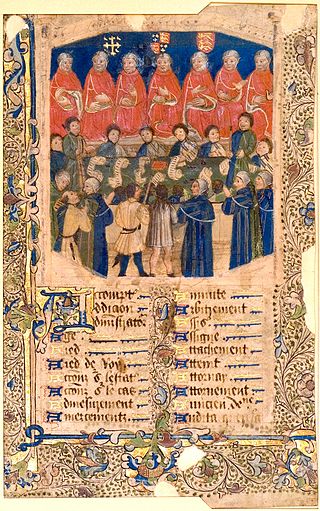
The Court of Common Pleas, or Common Bench, was a common law court in the English legal system that covered "common pleas"; actions between subject and subject, which did not concern the king. Created in the late 12th to early 13th century after splitting from the Exchequer of Pleas, the Common Pleas served as one of the central English courts for around 600 years. Authorised by Magna Carta to sit in a fixed location, the Common Pleas sat in Westminster Hall for its entire existence, joined by the Exchequer of Pleas and Court of King's Bench.
The Court of Criminal Appeal was an appellate court for criminal cases in the law of the Republic of Ireland. It existed from 1924 until 2014, when it was superseded by the Court of Appeal, which can hear appeals for all types of case.
The Court of Appeal in Ireland was created by the Parliament of the United Kingdom of Great Britain and Ireland under the Supreme Court of Judicature Act (Ireland) 1877 as the final appellate court within Ireland, then under British rule. A last appeal from this court could be taken to the House of Lords in London.
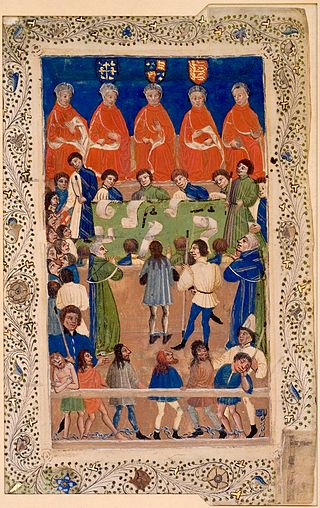
The Court of King's Bench, formally known as The Court of the King Before the King Himself, was a court of common law in the English legal system. Created in the late 12th to early 13th century from the curia regis, the King's Bench initially followed the monarch on his travels. The King's Bench finally joined the Court of Common Pleas and Exchequer of Pleas in Westminster Hall in 1318, making its last travels in 1421. The King's Bench was merged into the High Court of Justice by the Supreme Court of Judicature Act 1873, after which point the King's Bench was a division within the High Court. The King's Bench was staffed by one Chief Justice and usually three Puisne Justices.

The Court of King's Bench was one of the senior courts of common law in Ireland. It was a mirror of the Court of King's Bench in England. The King's Bench was one of the "Four Courts" which sat in the building in Dublin which is still known as "The Four Courts", and is still in use.
The Law Reports is the name of a series of law reports published by the Incorporated Council of Law Reporting.

The Exchequer of Ireland was a body in the Kingdom of Ireland tasked with collecting royal revenue. Modelled on the English Exchequer, it was created in 1210 after King John of England applied English law and legal structure to his Lordship of Ireland. The Exchequer was divided into two parts; the Superior Exchequer, which acted as a court of equity and revenue in a way similar to the English Exchequer of Pleas, and the Inferior Exchequer, which directly collected revenue from those who owed The Crown money, principally rents for Crown lands. The Exchequer primarily worked in a way similar to the English legal system, holding a similar jurisdiction. Following the Act of Union 1800, which incorporated Ireland into the United Kingdom, the Exchequer was merged with the English Exchequer in 1817 and ceased to function as an independent body, although the Irish Court of Exchequer, like other Irish courts, remained separate from the English equivalent.
The High Court of Justice in Ireland was the court created by the Supreme Court of Judicature Act (Ireland) 1877 to replace the existing court structure in Ireland. Its creation mirrored the reform of the courts of England and Wales five years earlier under the Judicature Acts. The Act created a Supreme Court of Judicature, consisting of a High Court of Justice and a Court of Appeal.
Certain former courts of England and Wales have been abolished or merged into or with other courts, and certain other courts of England and Wales have fallen into disuse.

The Court of Criminal Appeal was an English appellate court for criminal cases established by the Criminal Appeal Act 1907 It superseded the Court for Crown Cases Reserved to which referral had been solely discretionary and which could only consider points of law. Throughout the nineteenth century, there had been opposition from lawyers, judges and the Home Office against such an appeal court with collateral right of appeal. However, disquiet over the convictions of Adolf Beck and George Edalji led to the concession of a new court that could hear matters of law, fact or mixed law and fact.
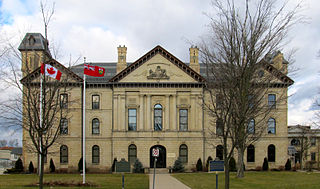
Accounts of the Indigenous law governing dispute resolution in the area now called Ontario, Canada, date from the early to mid-17th century. French civil law courts were created in Canada, the colony of New France, in the 17th century, and common law courts were first established in 1764. The territory was then known as the province of Quebec.














